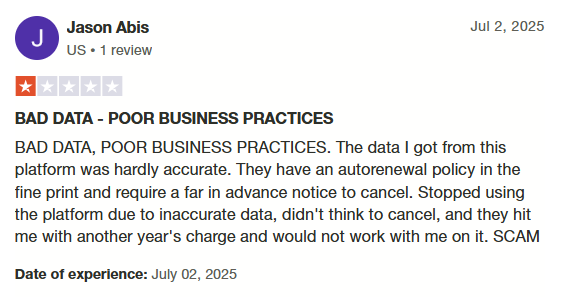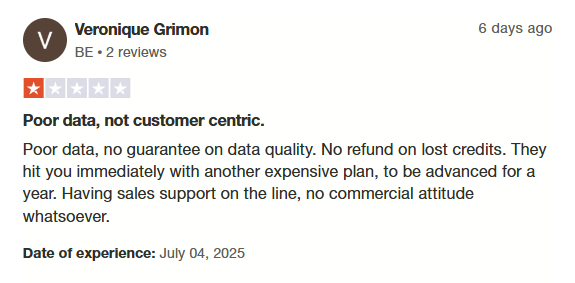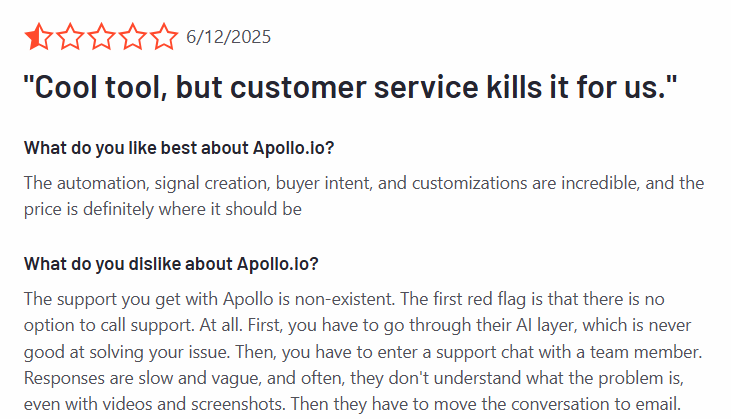Lusha vs ZoomInfo vs Leadsforge: Lead Generation Tool Comparison



Introduction
Lusha, Apollo.io, and Leadsforge.ai are all sales intelligence tools designed to help sales teams find business contacts and, together with sales engagement tools, drive revenue growth:
- Lusha touts itself as a B2B sales intelligence platform with verified global contact data.
- Apollo.io brands as an AI Sales Platform, combining a large database with outreach and enrichment.
- Leadsforge is a newer tool focusing on AI-driven prospecting, letting users describe an ideal customer to generate lists.
All three prioritize data accuracy and integration into sales workflows, but each has unique strengths.
Data Coverage and Contact Databases
Lusha emphasizes a global database of around 155M+ profiles. Its data is AI-powered and comprehensive, covering key markets in Europe and North America.
Apollo.io maintains access to 210M+ contacts. It aggregates multiple data sources to provide extensive business contacts.
Leadsforge reports a broad database of 500M+ prospects that it queries with AI. The large data coverage across all three tools means sales teams can target diverse markets.
Search & Filtering Capabilities
Lusha provides a traditional prospect search interface with advanced search filters. Users can filter by industry, job title, company size, and more.
Apollo similarly offers 65+ filter criteria. Apollo’s strength is combining this filtering with intent data, such as job changes and in-market signals.
Leadsforge includes no need to fiddle with filters. You simply describe your ideal lead in plain English (e.g. “CTOs in SaaS companies in the US”) and the platform generates a list.
Lead Generation Workflow
Each platform supports lead generation, but their workflows differ:
- Lusha focuses on finding contact details. Sales reps use Lusha mainly as a contact data provider. Once contacts are found, outbound tasks require other tools.
- Apollo.io is an all-in-one sales engagement platform. It lets users send email outreach and track results within the tool.
- Leadsforge combines both worlds via tools in its Forge ecosystem: it can generate verified lead lists and easily transfer it into outreach tools like Salesforge.
Data Reliability & Accuracy
Reliable, accurate contact information is crucial:
- Lusha's algorithms cross-check multiple sources to deliver reliable and up-to-date details, although sometimes they fail at that:


- Apollo's its Chrome extension can get verified emails and phone numbers in real time. Apollo’s data is generally reliable, though some inaccuracies can occur.
- Leadsforge’s AI verification means you receive fresh company and contact details for each lead.
Overall, all tools aim for high contact data quality, but Leadsforge highlights real-time verification and reduces bounces by using up-to-date info.
Contact Details
At the core of each tool is delivering contact details:
- Lusha provides phone numbers, email addresses, and social profiles for prospects.
- Apollo provides verified business emails, and often direct phone numbers for contacts.
- Leadsforge returns verified emails, phone numbers, job titles and more for each lead.
Company Data
Beyond personal contacts, sales teams often need company insights:
- Lusha provides company search alongside contacts - you can look up companies and see enriched data like industry, employee count, funding, etc.
- Apollo also holds firmographic company data for many contacts.
- Leadsforge's AI identifies company names for each lead.
Data Enrichment
All three allow bulk data enrichment:
- Lusha has CSV import to update lists
- Apollo’s Waterfall Enrichment keeps CRM data fresh
- Leadsforge can export lists or sync to CRMs.
Integration Capabilities
Smooth workflow requires connections to other sales tools.:
- Lusha integrates with major CRMs (Salesforce, HubSpot, etc.), letting users push enriched leads directly into sales databases.
- Apollo.io offers native integrations with HubSpot, Salesforce, and some outreach platforms. It also has a Chrome extension and APIs for custom integration.
- Leadsforge supports CRM integration as well, syncing directly with Salesforce, HubSpot, and Pipedrive. It goes further by offering API and Zapier connections.
User Experience & Onboarding
Lusha is known for a clean interface but requires some learning for filters and extensions.
Apollo has a robust UI with many features, which can feel overwhelming to new users who might need help from support. Unfortunately for them...


Leadsforge's platform uses conversational queries and minimal setup. Leadsforge also emphasizes minimal training: you “don’t have to use filters or complicated steps”.
Pricing and Plans
- Lusha: Follows a credit-based model. It offers a Free plan with limited monthly credits, then paid tiers starting around $29/user/month.
- Apollo.io: Has a free plan and paid plans from $49/user/month. Apollo uses a dual credit system (credit per email view, more for phone).
- Leadsforge: Offers flat monthly pricing starting at $49/month (includes 2,000 export credits).
Customization & Advanced Search
While Lusha and Apollo have many search filters, Leadsforge’s edge is speed over complexity.
You do not need to pick fields; just describe the target persona.
Leadsforge also lets you refine a list by adding more details, then re-verifying.
Sales Engagement & Outreach Efforts
Lusha stops at lead generation; outreach must be manual or via another tool.
Apollo is built to drive customer engagement: its sequences, call-dialer, and email tracking support intensive outreach campaigns.
Leadsforge too enables immediate action through Salesforge.
Advanced Analytics & Reporting
Analytics matter for monitoring sales activities:
- Apollo and Lusha both include analytics on outreach: tracking opens, replies, call outcomes, etc.
- Leadsforge is newer and its analytics focus is more on list effectiveness (bounce rates, verified lead count).
Team Scale & Enterprise Use
- Lusha boasts enterprise features like SOC 2 compliance.
- Apollo’s platform is built for large orgs (multi-user, Salesforce/Marketo sync).
- Leadsforge supports unlimited users on a team, centralized lead credit control, and advanced permissions (via API/CRM). Leadsforge is fully compliant with global standards (GDPR, CCPA), which is vital for international enterprises.
Additional Advanced Features
- AI Assistants: Leadsforge’s core is an AI search engine - it’s literally an assistant for finding leads. Its chat-like interface refines and verifies lists on-the-fly.
- Workflow Automation: Leadsforge, while focused on prospecting, easily connects to email sequence tools (like Salesforge) for automation.
Choosing Based on Business Needs
For AI-driven simplicity, Leadsforge is the best. Its ability to handle contact discovery with a natural language interface is unique. It is especially well-suited for businesses seeking to automate prospecting and execute outreach within one ecosystem of products.
Deciding on the Suitable Product
Leadsforge's comprehensive sales intelligence platform offers a broader range of capabilities in a single package. Key advantages of Leadsforge include:
- Real-time data verification (better data reliability)
- Natural-language lead search (advanced search functionality without the fuss)
- Flat pricing (predictable cost structure)
- Strong integration (CRM sync and API).
By additionally utilizing the tools in the Forge ecosystem, you can reduce tool switching, cut down on complexity and boost efficiency.
Ultimately, each serves sales processes well, but Leadsforge's AI-driven ease-of-use makes it a top choice for streamlining lead generation.
Wanna hear more from the Forge?
Frequently asked questions
Leadsforge is built for speed. You can sign up and start generating a list of leads in minutes by just typing your criteria (no scripts or workflow setup).
Leadsforge stands out by allowing users to describe their ideal customer in natural language. The platform then generates a targeted lead list based on this description, eliminating the need for complex filtering.
Yes, the credits stay yours, so once you get them, they can be used whenever you want, ensuring you have no stress about using them up, each month.